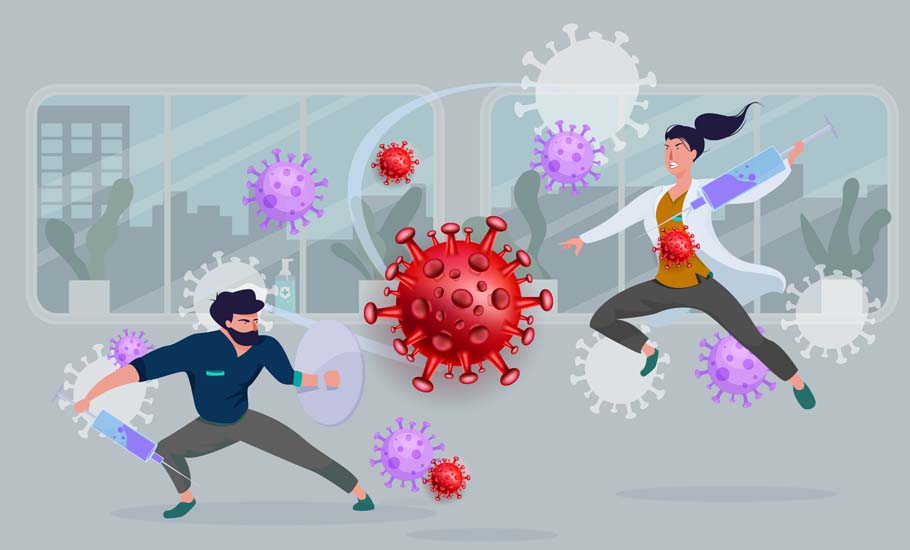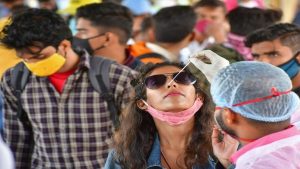
WHO has recently classified a new variant with a large number of mutations, BA.2.86, which is under monitoring at present. (Representational image)
Covirgin secrets: Why do some people not get Covid at all?
Am Imperial College study showed that people who have "higher levels of T-cells" from common cold coronaviruses were less likely to become infected with SARS-CoV-2

As the pandemic left behind a trail of destruction and death, scientists around the world have been puzzled by one cohort, who stubbornly never ever caught the virus. Known as the ‘No Covid’ or ‘Never Covid’ people, they, despite being exposed to public spaces and even had through an UK research study, “live virus” literally dripped into their nose, remained uninfected. This has earned them the nickname ‘Covirgins’.
Even as six million people have succumbed to the coronavirus disease in India so far, more than the populations of Berlin and Brussels put together, and nearly 4.30 crore cases have been recorded in the country, there were few people who simply never caught the virus at all in India and elsewhere around the world. This has completely baffled infectious disease specialists, who have devoted a lot of time to undertake studies to unravel this mystery behind this ‘Never Covid’ group.
Gradually, scientists are acquiring an understanding as to why some people remain completely immune to Covid.
Higher levels of T-cells
Last month, the National Heart and Lung Institute of Imperial College London seemed to offer a reason. According to their study, they found that people who have “higher levels of T-cells” (a type of cell in the immune system) from common cold coronaviruses were less likely to become infected with SARS-CoV-2, the virus that causes Covid-19.
“We found that high levels of pre-existing T-cells, created by the body when infected with other human coronaviruses like the common cold, can protect against Covid-19 infection,” Dr Rhia Kundu, the first author of the study, said on the Imperial College website. This new study, led by Imperial College London researchers, provides the first evidence of a protective role for these T cells.

Keen to understand why people exposed to the SARS-CoV-2 did not always result in infection, the study found that high levels of pre-existing T cells, which is triggered in the body when infected with other human coronaviruses like the common cold, comes to the aid to fight against Covid-19 infection. Moreover, these T-cells provide protection by attacking proteins within the virus, rather than the spike protein on its surface.
Also read: Omicron slowing down but WHO tracking several sub-lineages: Official
Lawrence Young, a professor of molecular oncology at Warwick University too told CNBC that early data suggests the Never Covid individuals have naturally acquired immunity from previous infections with common cold coronaviruses.
For some, it is possible to get rid of Covid in the early stages of the infection even before it actually affects the person.
A Guardian report meanwhile pointed out that in the first wave of the pandemic, Dr Leo Swadling at University College London and colleagues closely monitored a group of healthcare workers constantly exposed to infected patients. However, they never tested positive or developed antibodies themselves.
Blood tests revealed that around 15 per cent of them had T-cells reactive against Sars-CoV-2, plus other markers of viral infection. Possibly, memory T-cells from previous coronavirus infections – i.e., those responsible for common colds – cross-reacted with the new coronavirus and protected them from Covid. However, it is difficult for these scientists to check how often people block the virus from spreading at the early stages since it would involve extensive testing.
Another study conducted by an immunologist from Stockholm seemed to corroborate this theory. Prof Cecilia Söderberg-Nauclér, an immunologist at the Karolinska Institute in Stockholm, wanted to study why Swedes were not affected by the first wave of the pandemic even without following any precautions. She and her team examined databases of protein sequences from existing viruses and to her surprise, they identified a six-amino acid peptide in a protein from H1N1 influenza that matched a crucial part of the coronavirus spike protein.
The professor found that the immune responses triggered by H1N1 influenza – which was responsible for the 2009-10 swine flu pandemic – and possibly related subsequent strains, may give partial or full protection against Covid-19. But added that it just probably provides a cushion and may not save you if an infected person coughs in your face.
Also read: Deltacron becoming a variant of concern, cases in UK being monitored
Genetically resistant
Another reason why people may be resisting Covid is because they may be genetically resistant to the virus. In October, an international consortium of researchers started to hunt them down to be able to identify protective genes.
Researchers have said that the behaviour of human leukocyte antigens determine one’s response to COVID. Explaining to the media that the key genes that control the immune response are called human leukocyte antigen or the HLA genes, Danny Altmann, professor of immunology at Imperial College London pointed out that they matter for determining the body’s response to SARS-CoV-2.
“For example, people with the gene HLA-DRB1*1302 are significantly more likely to have symptomatic infection,” said Altmann.
On examining whether genes play a role in not catching Covid-19, another scientists Prof András Spaan at the Rockefeller told The Guardian that they were not looking for common gene variants that provide modest protection against infection. They were looking for potentially very rare gene variants that completely protect someone against infection.
This would mean that the ‘Never Covid’ people lack a receptor used by the pathogen to enter cells, so they cannot be infected. Identifying such genes could open the door for developing new treatments for Covid-19, in the same way that finding the CCR5 defects in HIV-resistant people showed the way to treat HIV.
Spaan thinks it is unlikely that the majority of those who have avoided Covid are genetically resistant, even if they have some partial immune protection. This means there is no guarantee they will not eventually become infected – many people who have dodged the virus all these years may just end up turning Covid positive at some juncture.
But scientists seem however clear about one thing: further studies into ‘Never Covid’ individuals will help in developing a better understanding of the immune response to SARS-CoV-2 and help them to generate universal variant-proof vaccines in the future.


